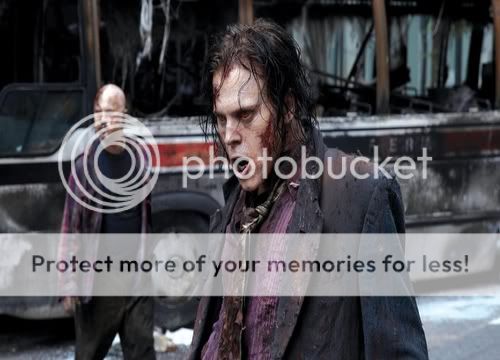In the conclusion of this article I'll be examining the lows AMC has experienced with their new batch of original programming, as well as a look at their greatest commercial achievement. We'll also take a peek at what's to come for the network in their newest series, and where it might fall on the scale of AMC's existing programs.
AMC was riding high on the
success of Mad Men and
Breaking Bad coming
into the summer of 2010. This is when they launched their third
original program since retooling the network. Rubicon
was meant to take another cast of relatively obscure but talented
actors and insert them into a compelling storyline with deep and
often troubled characters (basically following exactly in Breaking
Bad and Mad Men's
footsteps). Some things just don't work out the way we hope, though,
and such was the case with Rubicon.
The cast was solid for the most part, but no one stood out or
provided the audience with a particularly memorable performance. The
plot also fell short in enthralling viewers, despite its conspiracy-driven story.
Receiving mixed reviews and drawing in less of an
audience than either of AMC's other two current series, Rubicon
proved to be the first chink in the newly crafted armor of AMC's
original programming. Many thought it saw improvement in later
episodes, but the lack of viewers and favorable buzz led AMC to
cancel it after one season. As of now, Rubicon
is the only scripted series from AMC not to reach a second season
(including their two shows from the late 90's). More than for its
individual failure, Rubicon
showed that AMC wasn't infallible and could make a bad show just like
anyone else.
From
its pilot episode, The Walking Dead
looked to be a step back in the right direction for AMC. It
premiered in October of 2010 during one of the only aspects of AMC
programming to carry over from their classic film days, the network's
annual Fearfest (though it was originally dubbed Monsterfest). The
pilot, entitled “Days Gone Bye,” brought in a staggering 5.4
million viewers for its Halloween premiere. The first episode also
garnered critical acclaim for the raw and emotional acting, as well
as an unexpectedly deep storyline. Most critics' love declined as
the series went on, but the ratings only fell briefly before rising
to their highest numbers with the final two episodes. While critics
cited problems with unconvincing acting, clunky dialogue, and a weak
storyline to close out the six-episode run, the first season would
actually become the most-watched basic cable series ever. (Though
Falling Skies recently
beat out its premiere episode's record.)
Recently The Walking Dead received three Emmy nominations for the categories of Outstanding Prosthetic Makeup, Outstanding Visual Effects and Outstanding Sound Editing. Frank Darabont's adaption of this comic series has also been bringing in noms from the WGAs, The Saturn Awards and The 1st annual Critics' Choice Television Awards. Whether you loved it or would love to see it improve, a full 13-episode order for its second season is something to be excited about. Though it never earned the immense critical praise of Mad Men or Breaking Bad, the series has brought unprecedented commercial success for AMC.

The network appeared to be back on track after the hiccup of Rubicon, but unfortunately their worst series was still to come. Premiering in April of this year, The Killing was an adaption of the popular Danish series, Forbrydelsen. Though the first few episodes were well-received by the critics, after a short time the series began losing its charm. With little character development and zero plot development beyond the constant misleads, many people were wondering why they should be watching at all. The best episode came late in the series, but it served more as an indicator of what the show had been doing wrong for most of its run. The ratings also fell through the first season, though remained high enough for AMC to renew it. The few who had stayed loyal to the series even had trouble themselves swallowing the horrendous finale, which became synonymous with bad-TV-only-hours after it aired.
With AMC keeping Veena Sud and her writing team on, there is also little chance The Killing will see improvement in its sophomore year. The network's decision to renew the series and keep Sud in charge came before the season finale aired, so there is some small hope that AMC will take a firmer hand, which would be wise considering the sheer negativity it drew from critics already exhausted with the series, as well as outraged fans expecting a payoff for their commitment.

With
highs and lows aplenty behind them, it begs the question of how AMC's
newest series, Hell on Wheels,
will rate against the network's previous programs. Judging from the
trailer, the series is clearly well-made. With an entrancing
cinematic look, and meticulously crafted sets and wardrobes, this new
period piece is already showing similarities to the series that
relaunched AMC's original programming. The well delivered snippets
of dialogue also can't help but call up thoughts of Mad
Men. Although the series couldn't
be more different when it comes to story and setting, it will be the
third series from AMC to examine an eventful period in our country's
history. In this case, the year 1865 during construction of the
Transcontinental Railroad, and the appropriately gritty atmosphere
that comes with it. The cast, like all of AMC's series, isn't much
to speak of starting out. Colm Meaney (Star Trek: Deep
Space Nine) and Anson
Mount (Conviction,
though he may be more recognizable for a one episode appearance in
Lost) lead the cast,
along with hip-hop artist turned actor, Common. We will have to wait
until this fall, when the series premieres, to see whether Hell
on Wheels will be another
critical darling, a ratings powerhouse, or follow in the short steps
of Rubicon. Best not
to think about it ending up like The Killing.
For close to 27 years AMC has been broadcasting some form of entertainment. While the content has altered right along with their public perception, the network struggled through the good and bad changes to get to where it is today. Now home to some of the most acclaimed series currently on television – but not without their share of duds either – AMC can still hold their head high for providing its audience with both thought provoking and exciting programming.